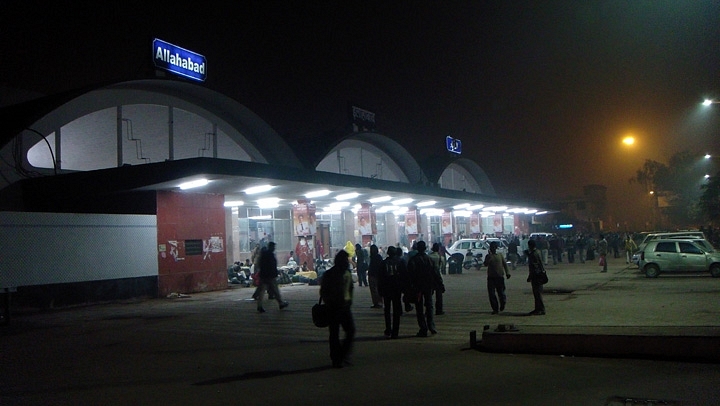Columns
The Dark Of A Railway Station

From antisocial elements to the department’s own staff, anybody can take you for a ride, bug you, manhandle you or detain you on the platforms or the adjoining areas. It led to the death of an acquaintance of the writer.
One of the few places in the world where I have been brilliantly ripped off in the course of my travels is the Dadar Railway Station area in Mumbai. Despite being alert, antennas extended, I’ve had my laptop case strap neatly sliced off from under my shoulders while being simultaneously tripped and then held down firmly, with the rogue preventing me from standing up to give a chase, and seeing the case vanish from sight in a sea of people swarming around, and then after being first held down, helped up by associates of the snatcher openly grinning at me. Not a hint of violence, and when I told them that the laptop bag only had some books and a change of shirt, one of them saluted me back in return!
“Aap jaise aur log hoyenge to hamara kyaa hoga?” (What will we do if we have some more people like you?), he said, smiling back at me, before melting back into the crowd to look for the next victim. “Come back”, I told him, “I want to hear your story. And I want my books and shirt back. So, how much for them?”
The books and the bag never returned, neither did the friend of the snatcher and slicer accept my offer for what it was worth, but I did ask around and read up on the area and learned to keep my eyes open.
On another occasion, I was waiting in the First/Upper Class Waiting Room at Dadar Central for my train to Pune. Walking up and down the platform, I spotted the game that the ticket examiners play to trap unwary visitors.
The overhead walkway from the Western Railways side exits also onto the streets outside, but it is built in such a way that a newcomer will go with the flow and often end up on the Central Railways platform looking for the exit that has been overshot. The newcomers can be spotted from a distance, and as they turn around to head back for the exit, a firm hand on the shoulder points them towards the ticket examiner office from where there are multiple ways out that include genuine railway court, not so genuine railway court and the settlements.
Their crime? That they have disembarked from a Western Railways train and wandered onto the Central Railways’ ‘territory’, though both are part of the larger Dadar Railway Station complex. Incidentally, this is not a crime anywhere else in India, at stations where more than one zone operate. Lucknow and Howrah come to mind. Maybe the population of those cities would not tolerate such atrocities in an independent India?
There are many other lesser scams that are fairly regular here. It is said that when ‘small’ crimes like this get a sort of traditional approval and sanctity, ‘traditional’ approvals for bigger crimes follow, with wholesale mutual cover-ups. An example that comes to mind pertains to the mysterious death of my work colleague, the young Abhishek Rajak.
On the night of 17 July 2014, Abhishek left office to reach Dadar Central, from where he was to catch — as he did regularly — the Kalyan (Fast) at 7:47 pm. For some reason, it appears that he was detained at the station and then, later on past midnight, found dead on the tracks, with no explanation forthcoming from any source on what transpired in the timeline between!
The CCTV at Dadar Station spotted him before the arrival of the Kalyan (Fast), after which he was said to have been detained by the TTEs as per the GRPF feedback, and then not seen on any of the CCTV recordings thereafter. This, even though the TTE office area has a bank of cameras observing it! A series of RTI applications and public grievances have brought forward outright threats on telephone as well as evasive answers in writing. This includes correspondence passing the buck completely to a private vendor called Sonal Enterprises which operated the CCTVs for Central Railways. Nine months later, there is no trace, or record, of the private business. All this at a railway station in a city considered to be India’s financial capital and carrying a threat perception of a serious nature!
The justice delivery system with the Indian Railways is based on the Railways Act. It is highly people-unfriendly and there shall be more essays on this specific aspect of the JDS in India since it impacts many of us on a day-to-day basis all the time. It concerns especially the otherwise law-abiding citizenry of India, who usually have no reason to need any justice delivery in their routine lives.
Support Swarajya's 50 Ground Reports Project & Sponsor A Story
Every general election Swarajya does a 50 ground reports project.
Aimed only at serious readers and those who appreciate the nuances of political undercurrents, the project provides a sense of India's electoral landscape. As you know, these reports are produced after considerable investment of travel, time and effort on the ground.
This time too we've kicked off the project in style and have covered over 30 constituencies already. If you're someone who appreciates such work and have enjoyed our coverage please consider sponsoring a ground report for just Rs 2999 to Rs 19,999 - it goes a long way in helping us produce more quality reportage.
You can also back this project by becoming a subscriber for as little as Rs 999 - so do click on this links and choose a plan that suits you and back us.
Click below to contribute.
Latest